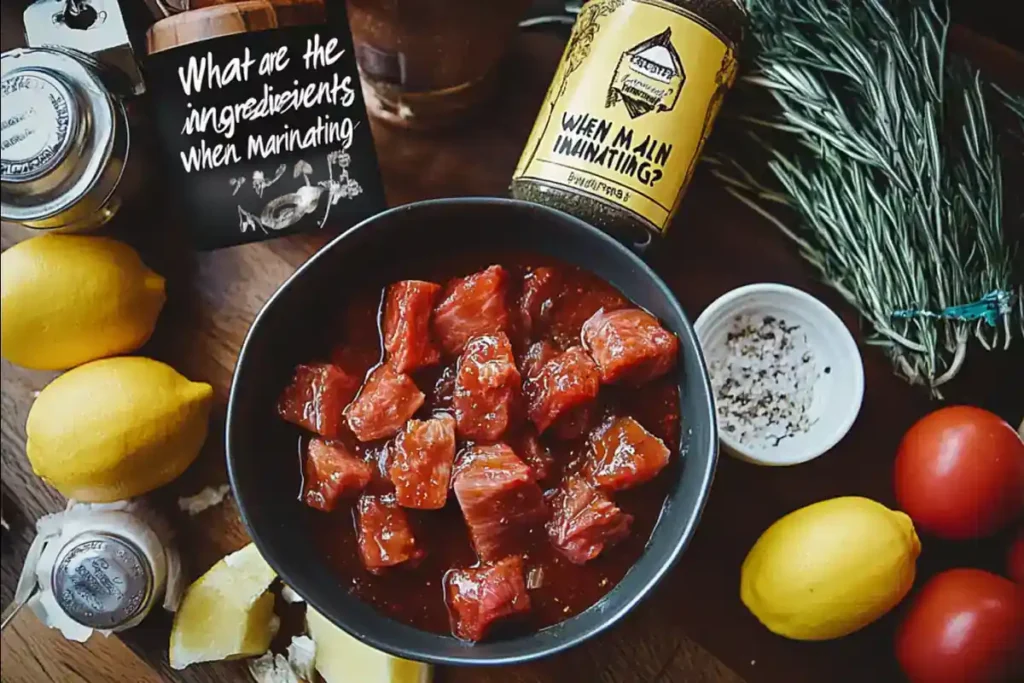Discover the essential components that make your marinades flavorful and effective.
Marinating is a fundamental technique in cooking that transforms ordinary dishes into extraordinary meals. Understanding what are the three main ingredients when marinating is key to creating delicious and tender meat. This comprehensive guide explores the essential components of a marinade, their roles, and how to balance them for the best results.
Understanding Marinades

A marinade is a seasoned liquid mixture used to soak food, particularly meat, before cooking. What are the three main ingredients when marinating determines how well the marinade will infuse flavor and tenderize the meat.
Marinating offers several benefits. Firstly, it imparts deep, rich flavors to the meat. Secondly, the acidic components in the marinade help tenderize tougher cuts, making them more succulent. Additionally, marinating can enhance the cooking process by reducing cooking time and preventing the meat from drying out.
Moreover, a well-balanced marinade ensures that the flavors are evenly distributed throughout the meat. What are the three main ingredients when marinating plays a crucial role in achieving this balance, resulting in a more enjoyable eating experience.
In the upcoming section, we’ll delve into the three essential components that make up any effective marinade.
The Three Main Ingredients When Marinating
When exploring what are the three main ingredients when marinating, you’ll find that any good marinade consists of three key components: acid, oil, and flavorings. These ingredients work together to enhance the flavor, texture, and overall quality of the meat.
Acid
Acid is the first main ingredient in a marinade. It serves multiple purposes:
- Tenderizing the Meat: Acids break down proteins in the meat, making it more tender.
- Flavor Enhancement: Adds a tangy or citrusy flavor that balances the richness of the meat.
Common Acids Used in Marinades:
- Vinegar: Such as balsamic, apple cider, or white vinegar.
- Citrus Juices: Like lemon, lime, or orange juice.
- Wine: Red or white wine can add depth to the marinade.
Oil
Oil is the second main ingredient in a marinade. Its roles include:
- Moisture Retention: Helps keep the meat juicy during cooking.
- Flavor Distribution: Carries and spreads the flavors of herbs and spices evenly over the meat.
Common Oils Used in Marinades:
- Olive Oil: Adds a rich, fruity flavor.
- Vegetable Oil: Neutral flavor that doesn’t overpower other ingredients.
- Sesame Oil: For an Asian-inspired marinade with a nutty taste.
Flavorings
Flavorings are the third main ingredient in a marinade. They add the specific taste profiles that make the marinade unique and delicious.
- Herbs: Such as rosemary, thyme, oregano, or cilantro.
- Spices: Including black pepper, paprika, cumin, or chili flakes.
- Aromatics: Like garlic, onion, ginger, or shallots.
Examples of Flavorings:
- Garlic and Herbs: For a classic, savory flavor.
- Spicy Elements: Such as chili peppers or hot sauce for heat.
- Sweeteners: Like honey or brown sugar to balance acidity.
In the next segment, we’ll provide a detailed explanation of each of these three main ingredients, exploring their roles and how they interact to create a perfect marinade.
How to Combine the Three Main Ingredients
Creating a well-balanced marinade involves properly combining acid, oil, and flavorings. This ensures that the meat is flavorful, tender, and juicy after cooking.
Proportions and Balance
The key to a great marinade is the right balance between acid and oil. A general rule is to use equal parts acid and oil, but this can be adjusted based on personal preference and the type of meat.
Basic Ratio:
- 2 parts Acid
- 2 parts Oil
- Flavorings to taste
For example, if you use 1/4 cup lime juice (acid), you would also use 1/4 cup olive oil.
Adjusting Based on the Type of Meat
Different meats absorb marinades differently. Therefore, you may need to adjust the proportions of the ingredients accordingly.
- Chicken: Can handle more acidic marinades and longer marinating times.
- Beef: Often benefits from a robust marinade with a balance of acid and oil.
- Fish and Seafood: Require less acidic marinades to prevent the meat from becoming too mushy.
Tips for Creating a Balanced Marinade
- Taste as You Go: Always taste the marinade before adding the meat to ensure the flavors are balanced.
- Adjust Seasonings: Add more herbs, spices, or sweeteners if needed to achieve the desired flavor profile.
- Consistency: Ensure the marinade is well-mixed and consistent in texture to coat the meat evenly.
In the next section, we’ll provide examples of classic marinades that utilize the three main ingredients effectively.
Examples of Classic Marinades Using the Three Main Ingredients
Understanding what are the three main ingredients when marinating allows you to create various marinades tailored to different cuisines and flavor profiles. Here are some classic marinades that effectively use acid, oil, and flavorings.
Lemon Herb Marinade
A bright and fresh marinade perfect for chicken and fish.
- Ingredients:
- Juice of 2 lemons (acid)
- 1/4 cup olive oil (oil)
- 3 cloves garlic, minced (flavoring)
- 2 tablespoons fresh parsley, chopped (flavoring)
- 1 teaspoon dried oregano (flavoring)
- Salt and pepper to taste
- Preparation:
- Combine lemon juice and olive oil in a bowl.
- Add minced garlic, parsley, and oregano.
- Season with salt and pepper.
- Mix well and use as a marinade for 4-6 hours.
Teriyaki Marinade
A sweet and savory marinade inspired by Japanese cuisine, ideal for beef, chicken, and tofu.
- Ingredients:
- 1/4 cup soy sauce (acid)
- 2 tablespoons rice vinegar (acid)
- 2 tablespoons honey or brown sugar (flavoring)
- 2 cloves garlic, minced (flavoring)
- 1 tablespoon grated ginger (flavoring)
- 1/4 cup vegetable oil (oil)
- Preparation:
- Mix soy sauce, rice vinegar, and honey in a bowl.
- Add minced garlic and grated ginger.
- Pour in vegetable oil and whisk until well combined.
- Use as a marinade for 4-6 hours or overnight.
Balsamic Marinade
A rich and tangy marinade perfect for beef and pork.
- Ingredients:
- 1/4 cup balsamic vinegar (acid)
- 1/4 cup olive oil (oil)
- 3 cloves garlic, minced (flavoring)
- 1 tablespoon Dijon mustard (flavoring)
- 1 teaspoon dried thyme (flavoring)
- Salt and pepper to taste
- Preparation:
- Combine balsamic vinegar and olive oil in a bowl.
- Add minced garlic and Dijon mustard.
- Stir in dried thyme, salt, and pepper.
- Mix thoroughly and use as a marinade for 4-6 hours.
These classic marinades showcase how balancing acid, oil, and flavorings can create delicious and versatile seasonings for various meats.
In the next part, we’ll discuss additional ingredients that can enhance your marinades beyond the three main components.
Marinating Techniques for Best Results
To maximize the benefits of marinating, it’s essential to follow proper techniques. This ensures that the flavors penetrate the meat effectively and that the meat remains safe to eat.
Proper Marinating Time
The length of time you marinate your meat significantly affects the outcome. Understanding what are the three main ingredients when marinating helps in determining the appropriate marinating time.
- Minimum Time: 30 minutes for basic flavor absorption.
- Optimal Time: 4 to 6 hours for thorough flavor penetration and tenderization.
- Maximum Time: Up to 24 hours, especially for tougher cuts, but avoid exceeding this to prevent the meat from becoming mushy.
In the upcoming section, we’ll discuss how to choose the right container for marinating and the importance of refrigeration.
Choosing the Right Container
Using the right container is crucial for effective marinating. Here are some tips:
- Non-Reactive Containers: Use glass, stainless steel, or food-grade plastic containers. Avoid aluminum or metal containers that can react with acidic ingredients, altering the flavor.
- Sealability: Opt for containers with tight-fitting lids to prevent spills and allow the meat to marinate evenly.
- Size Appropriateness: Choose a container that allows the meat to be fully submerged in the marinade.
Refrigeration and Storage Tips
Keeping the marinating meat at the right temperature ensures safety and quality.
- Refrigerate While Marinating: Always marinate chicken, beef, pork, or fish in the refrigerator to prevent bacterial growth.
- Avoid Marinating at Room Temperature: This can lead to spoilage and foodborne illnesses.
- Storing Leftover Marinade: Store any leftover marinade in a sealed container in the refrigerator and use it within a few days. Do not reuse marinade from raw meat unless it has been boiled to kill any bacteria.
Even Coating and Turning
Ensuring that the marinade evenly coats the meat is essential for uniform flavor distribution.
- Turn the Meat Occasionally: This helps in even absorption of the marinade.
- Use a Ziplock Bag: Marinating meat in a ziplock bag allows you to massage the marinade into the meat easily, ensuring thorough coverage.
Advancing to the following area, we’ll outline common mistakes to avoid when marinating meat, ensuring your efforts yield the best results.
Common Mistakes to Avoid When Marinating
Marinating is straightforward, but several common mistakes can compromise the quality of your dish. Avoiding these pitfalls will help you achieve delicious and tender meat every time.
Over-Marinating
While marinating enhances flavor and tenderness, over-marinating can have adverse effects.
- Effect on Texture: Excessive marinating, especially with strong acids, can break down the meat’s proteins too much, making it mushy.
- Optimal Time: Stick to the recommended marinating times based on the type of meat and acidity of the marinade.
Using Too Much Acid
An imbalance of acid in your marinade can overwhelm the meat.
- Flavor Overpowering: Too much acid can result in a marinade that tastes too tangy or sour.
- Texture Issues: High acidity can overly tenderize the meat, affecting its texture negatively.
- Solution: Balance acid with adequate oil and flavorings to create a harmonious marinade.
Not Marinating Evenly
Uneven marinating leads to inconsistent flavor distribution.
- Cause: Not flipping the meat or using a container that restricts movement.
- Solution: Turn the meat occasionally and use a non-reactive container that allows the meat to move freely in the marinade.
Using a Dirty Container
Marinating in a contaminated container can introduce unwanted flavors or bacteria.
- Prevent Bacterial Growth: Always use clean containers and ensure they are properly sealed.
- Solution: Wash containers thoroughly before use and avoid cross-contamination by keeping raw and cooked foods separate.
Reusing Marinade from Raw Meat
Using marinade that has been in contact with raw meat poses a health risk.
- Bacterial Contamination: Raw meat can introduce harmful bacteria into the marinade.
- Solution: Discard used marinade or boil it for at least 5 minutes before using it as a sauce.
In the next section, we’ll discuss the health benefits of proper marinating, highlighting how the ingredients contribute to a nutritious meal.
Health Benefits of Proper Marinating
Marinating not only enhances the flavor and texture of meat but also offers several health benefits. Understanding what are the three main ingredients when marinating allows you to create healthier and more balanced dishes.
Nutritional Advantages of Marinade Ingredients
- Lean Protein: Marinating lean meats like chicken breasts or turkey helps retain moisture without adding excessive fat.
- Vitamins and Minerals: Ingredients like citrus juice (vitamin C) and herbs (vitamins A, C, K) provide essential nutrients.
- Antioxidants: Herbs and spices often contain antioxidants that combat free radicals in the body.
Healthier Cooking Tips
- Trim Excess Fat: Removing visible fat from meat before marinating reduces unnecessary calories and saturated fats.
- Use Lean Cuts: Opt for skinless chicken breasts, turkey, or lean beef cuts to keep the meal nutritious.
- Control Oil Usage: Measure the amount of oil used in the marinade to avoid excess calories. Using healthier oils like olive oil provides beneficial monounsaturated fats.
Balancing Taste with Nutrition
By carefully selecting marinade ingredients, you can enhance the flavor of your meat while keeping the dish healthy.
- Herbs and Spices: Provide intense flavors without adding calories, sodium, or unhealthy fats.
- Acidic Components: Help in tenderizing meat naturally, reducing the need for marinades high in sodium or sugar.
- Healthy Fats: Incorporating oils like olive oil ensures that the meal includes heart-healthy fats essential for overall health.
Additionally, marinating encourages the use of fresh and whole ingredients, contributing to a balanced and wholesome meal.
In the next chapter, we’ll explore culinary inspirations and international pairings that complement what are the three main ingredients when marinating.
Creative and Unique Sauces
Enhancing your marinated meat with unique sauces can add an extra layer of flavor and make your dishes stand out. Here are some creative sauce ideas to try with your marinated meat, understanding what are the three main ingredients when marinating.
Mango Salsa

Mango salsa brings a sweet and tangy flavor that complements the savory marinade.
- Ingredients:
- 1 ripe mango, diced
- 1/2 red onion, finely chopped
- 1 jalapeño, seeded and minced
- 2 tablespoons fresh cilantro, chopped
- Juice of 1 lime
- Salt to taste
- Preparation:
- Combine all ingredients in a bowl.
- Mix well and let sit for at least 15 minutes to meld flavors.
- Serve fresh alongside your marinated meat.
This salsa adds a tropical flair and a refreshing contrast to the rich and tangy flavors of the marinade, making each bite more exciting.
Chipotle Aioli
Chipotle aioli offers a smoky and creamy addition to your marinated meat.
- Ingredients:
- 1/2 cup mayonnaise
- 2 chipotle peppers in adobo sauce, minced
- 2 cloves garlic, minced
- 1 tablespoon lime juice
- Salt to taste
- Preparation:
- Mix mayonnaise, chipotle peppers, garlic, and lime juice in a bowl.
- Stir until smooth and creamy.
- Adjust salt to taste and refrigerate before serving.
This sauce provides a rich and smoky flavor that enhances the grilled meat’s taste, adding depth and complexity.
Pineapple Teriyaki Glaze
Pineapple teriyaki glaze introduces a sweet and savory balance to your marinated meat.
- Ingredients:
- 1 cup pineapple juice
- 1/2 cup soy sauce
- 1/4 cup brown sugar
- 1 tablespoon grated ginger
- 2 cloves garlic, minced
- 1 tablespoon cornstarch mixed with 2 tablespoons water
- Preparation:
- Combine pineapple juice, soy sauce, brown sugar, ginger, and garlic in a saucepan.
- Bring to a simmer over medium heat.
- Add the cornstarch mixture and stir until the glaze thickens.
- Remove from heat and let cool before using.
This glaze adds a glossy finish and a burst of sweetness that complements the marinade’s tanginess, creating a harmonious flavor profile.
In the next segment, we’ll provide DIY sauce recipes that allow you to customize your grilled meat even further.
DIY Sauce Recipes
Creating your own sauces can add a personal touch to your What are the three main ingredients when marinating understanding, allowing you to tailor flavors to your preference. Here are some easy DIY sauce ideas to try.
Simple Garlic Lime Sauce

A quick and zesty sauce that enhances the marinated meat.
- Ingredients:
- 1/4 cup olive oil
- Juice of 2 limes
- 3 cloves garlic, minced
- 1 tablespoon honey
- Salt and pepper to taste
- Preparation:
- Whisk together olive oil, lime juice, minced garlic, and honey in a bowl.
- Season with salt and pepper.
- Mix well and drizzle over the grilled meat.
This sauce adds a bright and tangy flavor that complements the marinade, perfect for drizzling over grilled chicken or steak.
Spicy Cajun Sauce
A bold and flavorful sauce that adds a kick to your meal.
- Ingredients:
- 1/2 cup mayonnaise
- 2 tablespoons Cajun seasoning
- 1 tablespoon hot sauce
- 1 teaspoon paprika
- Salt and pepper to taste
- Preparation:
- Combine mayonnaise, Cajun seasoning, hot sauce, and paprika in a bowl.
- Mix until smooth and creamy.
- Season with salt and pepper as needed.
This sauce provides a spicy and creamy element that pairs wonderfully with the marinated meat, adding heat and richness.
Creamy Herb Sauce
A versatile and creamy sauce that brings freshness to your dish.
- Ingredients:
- 1/2 cup Greek yogurt
- 2 tablespoons fresh parsley, chopped
- 1 tablespoon fresh dill, chopped
- Juice of 1 lemon
- Salt and pepper to taste
- Preparation:
- Combine Greek yogurt, parsley, dill, and lemon juice in a bowl.
- Stir until smooth and well mixed.
- Season with salt and pepper to taste.
This sauce offers a light and herbaceous flavor that balances the marinade’s tanginess, perfect for dipping or drizzling over the meat.
In the following segment, we’ll answer some frequently asked questions to help you master the art of marinating and grilling meat.
Frequently Asked Questions (FAQs)
What are the three main ingredients when marinating?
The three main ingredients when marinating are:
- Acid: Such as citrus juice or vinegar, which tenderizes the meat.
- Oil: Helps in distributing flavors and keeping the meat moist.
- Flavorings: Including herbs, spices, garlic, and onions that impart taste to the meat.
What are the 3 basic components of marinating?
The three basic components of marinating are:
- Acid: Provides tenderness by breaking down proteins.
- Oil: Moisturizes and distributes flavors evenly.
- Flavorings: Add depth and complexity to the meat’s taste.
What is the secret to a good marinade?
The secret to a good marinade lies in balancing the three main ingredients: acid, oil, and flavorings. Proper proportions ensure that the meat is flavorful, tender, and juicy without becoming mushy or overpowering. Additionally, allowing adequate marinating time and evenly coating the meat are crucial for optimal results.
What is the basic marinade formula?
The basic marinade formula includes:
- 2 parts Acid
- 2 parts Oil
- Flavorings to taste
For example, if using 1/4 cup lime juice (acid), you would also use 1/4 cup olive oil (oil) and then add herbs, spices, and aromatics to achieve your desired flavor profile.
Which of the following must be avoided in marinating meat?
When marinating meat, avoid:
- Using too much acid: This can make the meat mushy and overly tangy.
- Over-marinating: Especially with strong acids, as it can break down the meat too much.
- Reusing marinade from raw meat: It can lead to bacterial contamination unless boiled.
- Using a reactive container: Such as aluminum, which can alter the flavor.
Proceeding to the next chapter, we’ll conclude with a recap and final thoughts on mastering marinating techniques.
Conclusion
In addressing what are the three main ingredients when marinating, we’ve explored the essential components that make marinades effective and flavorful. Understanding the roles of acid, oil, and flavorings allows you to create balanced and delicious marinades that enhance the flavor and texture of your meat.
Balancing these ingredients ensures that your marinated meat is tender, juicy, and bursting with flavor. Whether you follow a classic marinade recipe or experiment with your own combinations, mastering these three main ingredients is the key to elevating your cooking.

